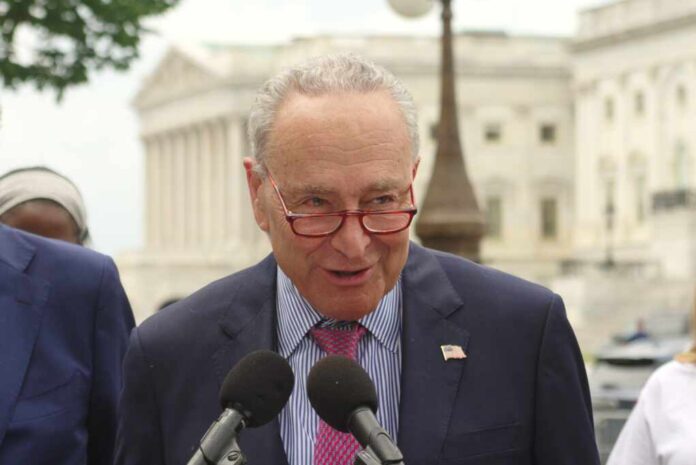
Senator Chuck Schumer has renamed Trump’s healthcare bill “We’re All Going to Die Act” in response to its proposed Medicaid cuts that could leave millions without insurance.
At a Glance
- Senate Minority Leader Chuck Schumer mockingly renamed Trump’s “Big, Beautiful Bill” as the “We’re All Going to Die Act” due to concerns over Medicaid cuts
- Schumer’s comments followed Republican Senator Joni Ernst’s town hall remark that “Well, we all are going to die” in response to healthcare concerns
- Congressional Budget Office estimates up to 16 million Americans could lose health insurance if the bill passes
- The bill includes making cuts to the Department of Government Efficiency (DOGE) permanent, which Democrats claim will cause hospital and nursing home closures
- Senate Majority Leader John Thune aims to pass the bill by July 4, despite hesitation from some Republican senators
Schumer’s Fiery Criticism of Trump’s Healthcare Plan
Senate Minority Leader Chuck Schumer has launched a blistering attack on President Donald Trump’s healthcare legislation, dubbing it the “We’re All Going to Die Act.” The provocative nickname comes in direct response to Iowa Republican Senator Joni Ernst’s controversial town hall comment where she stated, “Well, we all are going to die,” when confronted with concerns about the bill’s potential impact. Schumer’s renaming of what Trump has called his “Big, Beautiful Bill” signals escalating partisan tensions over healthcare reform as Republicans push to pass the legislation before the July 4 recess.
The Congressional Budget Office’s analysis has intensified Democratic opposition, with estimates suggesting up to 16 million Americans could lose health insurance coverage if the bill becomes law. Schumer has focused particularly on the proposed Medicaid revisions, which he argues would devastate vulnerable populations who rely on federal health services. These cuts are part of broader fiscal measures included in the legislation, which Republicans maintain are necessary to address government spending and inefficiency.
Medicaid Cuts at Center of Controversy
At the heart of Schumer’s criticism lies the bill’s proposed changes to Medicaid funding. Democrats claim these adjustments would result in reduced healthcare access for millions of Americans, particularly affecting seniors in nursing homes, children, and individuals with disabilities. Republican leadership has defended the measures as necessary reforms to ensure program sustainability, while Democrats characterize them as sacrificing healthcare for tax breaks benefiting wealthy Americans.
The bill includes provisions to make cuts to the Department of Government Efficiency (DOGE) permanent, which Schumer warns would lead to hospital closures, nursing home shutdowns, and healthcare worker layoffs. Senate Majority Leader John Thune remains committed to passing the legislation by Independence Day, despite growing concerns from some Republican senators about the bill’s potential impact on the national debt and constituent healthcare access.
Republican Response and Path Forward
Several Republican senators have expressed reservations about supporting the bill in its current form. Their hesitation stems from constituent feedback and concerns about how the proposed cuts might affect healthcare facilities in their states. Despite these internal party tensions, Republican leadership continues to frame the legislation as essential for fiscal responsibility and government efficiency, emphasizing that the bill addresses long-standing issues with federal healthcare spending.
The debate continues as Americans across the country watch closely to see how potential changes to healthcare policy might affect their access to medical services. Healthcare providers and advocacy groups have also joined the conversation, with many expressing concern about the bill’s potential ramifications for patient care and facility operations. As the July 4 target date approaches, both parties are digging in for what promises to be a contentious legislative battle with significant implications for millions of Americans.

























